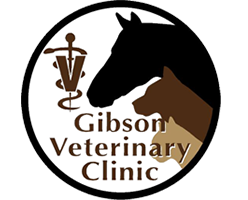Small Animals
Gibson Veterinary Clinic provides a wide range of veterinary services for small companion animals.
Wellness care and planning involves individual consultations with our veterinarians about preventive care, dental issues, and routine surgical services such as spaying and neutering. Using state-of-the-art equipment and technology, we are prepared for any crisis or medical need. We also offer alternative treatments, such as acupuncture and chiropractic care, for your small companion animals.


Additionally, we provide limited Boarding Services for the small companion animals of our current clients. Visit our Pet Care pages for additional information about our services in the following areas:
This is a great time to ask questions. Our veterinary team wants to make sure you’re completely comfortable with the information we’re providing. Our veterinary technician will likely come back to wrap things up and will provide you with helpful pet care information and answer wellness and care questions for you. Our front desk staff will process your payment and schedule any needed follow up. Please note: Our goal is to see all our clients and patients on time, and although we have contingencies for emergencies, there will be times where the unexpected will create delays. We will ensure these are minimized as much as possible.
Our progressive surgical suite allows our veterinary surgeons to perform a wide variety of surgical procedures. Some surgical options include bone-pinning, plating, and external fixators, as well as soft-tissue surgeries ranging from c-sections and tumor removal to routine spays and neuters. For our specialized surgeries, Gibson Veterinary Clinic works with a board certified surgeon that will travel to our clinic to perform surgeries for our clients’ convenience. The specialist for Gibson Veterinary Clinic uses the advanced technology of laser surgery for less bleeding, tissue damage, and general trauma to your pet, as well as to maximize recovery time. This wonderful surgical technology is typically used for procedures where minimized blood loss and optimal pain control is critical.
&
Therapeutic Services
We utilize the safest available anesthetics to provide an extra margin of safety for your pets. Patients older than 7 years of age, or those with other health concerns, have screening blood work performed prior to administering anesthesia. We also recommend performing this blood work on our younger patients to help establish a baseline and identify any potential problems early on. All patients are closely monitored for heart rate, respiration rate, EKG, temperature, oxygen and carbon dioxide levels while under anesthesia using the most modern equipment. Monitoring continues through the recovery period until the patient is awake and alert.
Our on-site X-ray equipment and ultrasound capabilities provide quality imaging to aid in diagnosing many disorders. By being able to perform our radiographs on-site, we are able to find the diagnosis quicker for both our small and large animal patients. For complex or unusual cases, we send our X-rays for interpretation by board-certified radiologists.
Services








